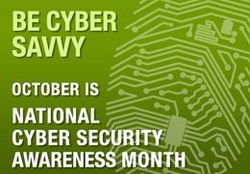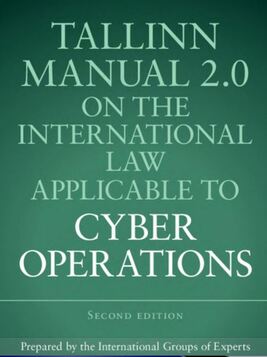Recent activity in Ukraine has demonstrated the way that cyber operations influence military actions as technology is used for almost every aspect of modern living. I had the opportunity to attend the International Conference on Cyber Conflict in Tallinn Estonia, the home of the NATO Center of Excellence for Cyber Defense. Speakers included the Ambassador from Ukraine and General Nakasone, Head of US Cyber Command. The attached presentation gives some of the thoughts behind the concept of Cyber Warfare and the US stance today. You can look at the presentation here. cyber_war_22.pdf |
|
0 Comments
 For 10 years now the US has attempted to raise awareness of the general public about the importance of each person’s involvement in creating a safe internet environment. Yet in a recent poll at a technical university among prospective students applying for college less than 10% had even heard of this awareness campaign! For many the news of Target, JP Morgan and others produces some momentary concern that quickly passes with “this won’t happen to me, I have nothing of value or importance”. This is part of the change in thinking that is required to move from unaware and unwary to having a proactive stance when using smartphone, laptop, or desktop to access email, social media or websites. Start with learning about your own “cyber hygiene”. Just as we have learned to wash our hands during flu season and brush teeth to reduce disease, some small actions can greatly improve your chance to enjoy the benefits of the world wide network without the “viruses” or malware. 1) Create passwords for all of your devices. More than 1/3 of US devices attached to the net are open with no password leaving them easy target for someone to control remotely by installing unwanted software on those devices. 2) Choose different passwords for your different devices and services that are not among the simple ones like password, 123456 or iloveyou that can be easily guessed by adversaries. 3) Keep your systems updated to enjoy the protection of recent fixes by the vendors such as Microsoft, Apple, Google, Adobe and others. 4) Ask for help from someone that is knowledgeable if you are uncertain, or give assistance to your aging friends and relatives. These are just a few steps and more information is available on-line by following this web link http://www.dhs.gov/blog/2014/10/03/national-cyber-security-awareness-month-2014-engaging-all-americans-online-safety. Be safe on-line and enjoy the marvels of connecting with people and information and services around the globe. |
Jon Haass
Grew up under the huge skies of Wonderful Wyoming and studied the dance of galaxies with telescopes and computers. Archives
August 2023
Categories
All
|


 RSS Feed
RSS Feed